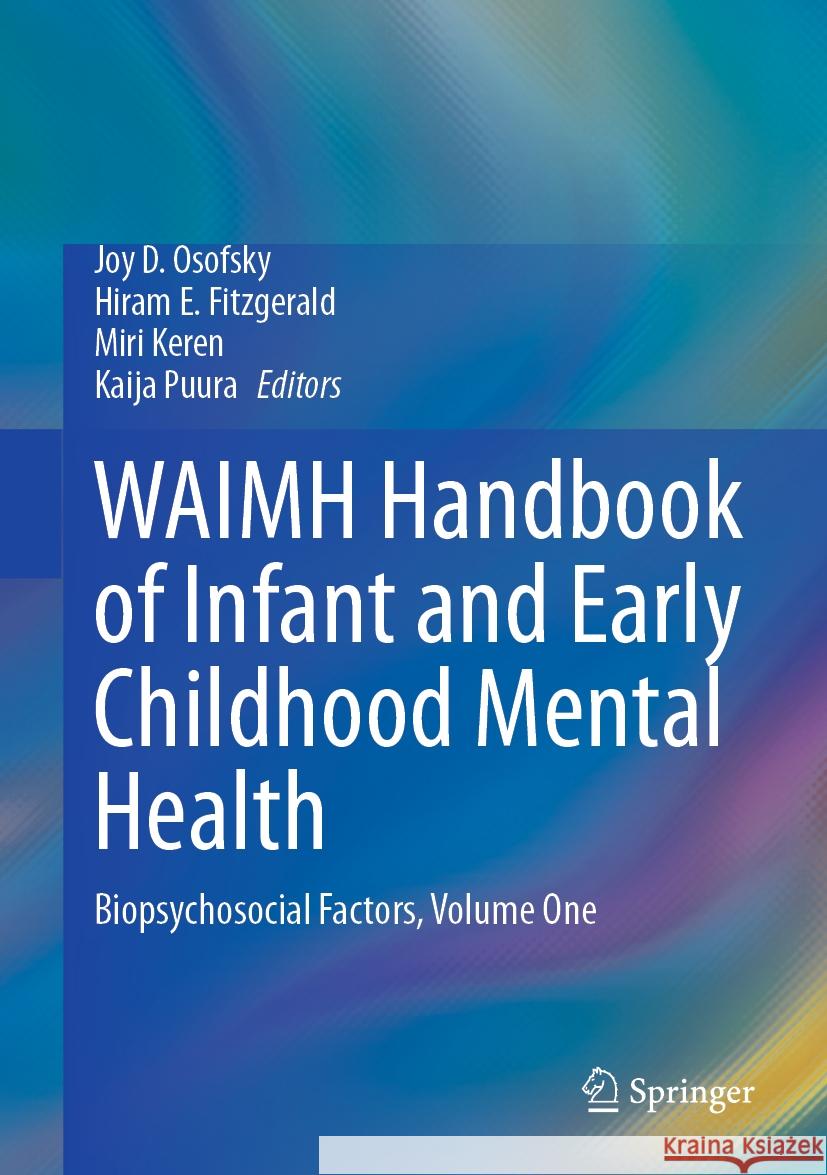Waimh Handbook of Infant and Early Childhood Mental Health: Biopsychosocial Factors, Volume One » książka



Waimh Handbook of Infant and Early Childhood Mental Health: Biopsychosocial Factors, Volume One
ISBN-13: 9783031486265 / Angielski
Waimh Handbook of Infant and Early Childhood Mental Health: Biopsychosocial Factors, Volume One
ISBN-13: 9783031486265 / Angielski
(netto: 958,46 VAT: 5%)
Najniższa cena z 30 dni: 886,75
ok. 22 dni roboczych
Bez gwarancji dostawy przed świętami
Darmowa dostawa!
Part 1. Infant and Early Childhood Development.- Overview.- Chapter 1. Social-Emotional Development During Infancy and Early Childhood.- Chapter 2. Perinatal Indicators of Social-Emotional Development During Infancy and Early Childhood.- Chapter 3. Temperament in Infants and Toddlers.- Chapter 4. Cognitive Development During Infancy and Early Childhood.- Chapter 5. Toddlerhood, Development, and Mental Health.- Chapter 6. Sex Differences and Vulnerabilities During Infancy and Early Childhood Development.- Part 2. Neurobiological Influences During Infancy and Early Childhood.- Overview.- Chapter 7. Genes and Epigenetics from Prenatal to Preschool.- Chapter 8. Neuroendocrinological and Stress Regulation During Infancy and Early Childhood.- Chapter 9. Parent-Infant Biobehavioral Synchrony.- Chapter 10. Intersubjectivity and Interception of the Body During Infancy.- Part 3. Parenting and Caregiving of Infants and Toddlers.- Overview.- Chapter 11. Parent-Infant Attachment Relationships.- Chapter 12. Parent-Infant Activation Relationships.- Chapter 13. Mother-Infant Interaction.- Chapter 14. Father-Infant Interaction.- Chapter 15. Co-Parenting of Infants and Toddlers.- Chapter 16. Adolescent Mothers of Infants and Toddlers.- Chapter 17. The Effects of Trauma on the Parent-Infant Relationship.- Chapter 18. Parents with Substance Use Disorders.- Chapter 19. Same-Sex Parenting of Infants and Toddlers.- Chapter 20. Reflective Functioning, Mentalization, and Infant Development.
Joy D. Osofsky, Ph.D. is a clinical and developmental psychologist, Ramsay Chair of Psychiatry and Barbara Lemann Professor of Child Welfare at Louisiana State University Health Sciences Center. She has published widely authoring or editing seven books on trauma in the lives of children. Dr. Osofsky is past president of ZERO to THREE and World Association for Infant Mental Health. She serves as Clinical Consultant on the Leadership team for Zero to Three Infant Toddler Court Program and Co-Principal Investigator for NCTSN Center, Terrorism and Disaster Coalition for Child and Family Resilience. In 2021, she was honored with the ZERO to THREE Lifetime Achievement Award.
Hiram E Fitzgerald, PhD, IMH-E® IV is University Distinguished Professor Emeritus in the Department of Psychology at Michigan State University. His major areas of research include the study of infant and family development, risk, resilient and adverse childhood experiences, the impact of fathers on early child development, and the etiology of alcohol use disorders. He is past executive director of WAIMH, and is a Fellow of the American Psychological Association, and the Association of Psychological Science. He is a recipient of the designation “Honorary President” of the World Association of Infant Mental Health, and the ZERO to THREE Dolley Madison Lifetime Achievement Award.
Miri Keren, MD. is Assistant Clinical Professor Emeritus at the Tel Aviv University Sackler Medical School. Her main research interests are about infant psychopathology and diagnoses, eating disorders in infancy, parental psychopathology and parenting, parent-Infant relationships disorders, and PTSD of infancy. As President of the World Association of Infant Mental Health in the years 2012-2016, she has been very invested in the implementation of a declaration of Infant’s Rights. In 2000, she founded the Israeli WAIMH Affiliate and is currently its Honorary President, and she is Chairperson of the World Psychiatric Association Perinatal and Infant Mental Health Section. She received the WAIMH Lebovici Award in June 2021.
Kaija Pura, MD, PhD. is Professor of Child Psychiatry in Tampere University, Finland, and Chief Physician in the Department of Child Psychiatry in Tampere University Hospital. She has authored or co-authored over 90 peer reviewed articles, chapters, and books on assessment and treatment of young children. She is a child mental health expert and advisor for the national children’s TV-program “Jyrkin ja Neposen kommervenkkejä,”an Associate Editor of the Infant Mental Health Journal, Executive Director of the World Association for Infant Mental Health, Vice President of the International Association for Child and Adolescent Psychiatry and Allied Professions, and President of the Finnish Association for Child and Adolescent Psychiatry
This book examines basic knowledge in the field of infant and early childhood mental health. It focuses on cognitive, social, and emotional development of infants and toddlers and examines different aspects of neurobiological development, including genes and epigenetics as well as biobehavioral synchrony. In addition, the book addresses parenting and caregiving issues, including attachment, parent-infant relationships, and high-risk factors (e.g., the effects of trauma on the infant-caregiver relationship, adolescent parenting, and parents with substance abuse disorders).
Key areas of coverage include:
- Social-emotional and cognitive development during infancy and early childhood.
- Temperament in infants and toddlers.
- Neurobiological influences from infancy through early childhood.
- Parenting and caregiving of infants and toddlers.
- Reflective functioning, mentalization, and infant development.
1997-2025 DolnySlask.com Agencja Internetowa
KrainaKsiazek.PL - Księgarnia Internetowa









